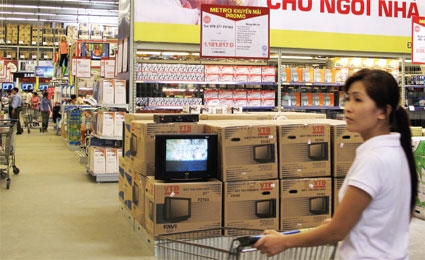Foreign retailers await key to unlock market
However, the Ministry of Industry and Trade’s (MoIT) draft decree made public last week still leaves regulations vague and hard for investors to follow.
The 45-article draft decree provides for definitions on retailing services, retail goods and outlets, retail sales planning and particularly the economic needs test (ENT), seen as a major obstacle for local authorities to work with retail outlet establishment applications, especially those from foreign-invested enterprises and foreign investors.
 |
| Big names are already part of the local retail market’s fabric |
In the past, the government did not make any document guiding the application of the ENT for the establishment of retail outlets and more outlets beyond the first one of foreign-invested enterprises, which hindered the licencing of retail outlet establishments.
Dang Duong Anh, executive partner of Vilaf Law Firm, said “the draft decree has goodwill to deal with these obstacles but it accommodates improper regulations.”
While stressing that the establishment of retail outlets of every businesses, including those with foreign capital, must be in conformity with masterplans of the localities where they are to be set up, the draft regulates the approval of retail outlets beyond enterprises’ first one if they meet three criteria. They are the number of local retail outlets, market stability and population density.
Accordingly, market stability is the stable operation of the existing retail system on the basis of identifying impacts on existing retail shops.
“The consideration of licence for retail outlets on the basis of “market stability” defined in the draft will create difficulties for the licencing process as this criterion completely brings a qualitative manner and may depend on subjective decision of the licencing authorities,” Anh told VIR.
“This is a big obstacle not only for authorised agencies, but also for businesses and investors to follow in presenting the “market stability” in their applications before the authority,” he said.
Anh also argued that the consideration of licencing retail outlets, including outlets beyond the first outlet owned by foreign-invested enterprises, on the basis of population density defined in the draft, which implies that the less populated area the fewer retail stores it has, would not be in line with the government’s investment encouragement policies, including foreign investment, in remote and less populated areas.
According to the draft, inhabitant density is identified and applied to geographical regions including cities, districts and villages.
Fred Burke, managing partner of Baker & McKenzie Law Firm, said because of an absence of a clear definition of the test, local departments of planning and investment were unwilling to even accept applications. “Relevant authorities should be able to cite clear and concrete reasoning for refusing an applicant. And a clear appeal process should be established to reduce the impact and effect of any misunderstanding that may occur in the application process,” Burke told VIR in a recent interview.
Since Vietnam officially joined the WTO in early 2007, the government and MoIT issued several legal documents regulating and guiding trading and distribution activities by enterprises with foreign capital, including Decree 23/2007/ND-CP and Circular 09/2007/TT-BTM dated February 2007 and July 2007, respectively. Each of these documents only has one article mentioning the necessity for localities to approve the establishment of foreign-owned retail outlets beyond the first one only on the basis of the ENT.
Under Decree 23, the government ruled that the establishment of any additional retail sales outlet after the first such establishment shall be subject to a decision of the provincial People’s Committee in accordance with guidelines of the former Ministry of Trade (now MoIT) and in accordance with the order and procedures stipulated in the decree.
Circular 09 guiding the implementation of Decree 23 then regulated that the establishment of retail outlets in additional to the first outlet shall be considered on a case-by-case basis and shall depend on the number of retail outlets, market stability and population density in the province or city where the retail outlet is to be set up, and consistency of the investment project with the masterplan of such province.
The above-mentioned draft decree is the first ever legal document entirely dedicated for retail services since Vietnam allowed foreign firms to set up retail outlets under WTO commitments.
What the stars mean:
★ Poor ★ ★ Promising ★★★ Good ★★★★ Very good ★★★★★ Exceptional
Related Contents
Latest News
More News
- Foreign fruits flood Vietnamese market (December 09, 2025 | 13:22)
- Vietnam’s fruit and vegetable exports reach $7.8 billion in first 11 months (December 05, 2025 | 13:50)
- Vietnam shapes next-generation carbon market (November 26, 2025 | 15:33)
- PM urges Ho Chi Minh City to innovate and remain Vietnam’s economic locomotive (November 26, 2025 | 15:29)
- Experts chart Vietnam's digital finance path: high hopes, high stakes (November 14, 2025 | 10:56)
- Vietnam’s seafood imports surge 30 per cent in first 10 months (November 10, 2025 | 19:35)
- Vietnam’s durian exports hit $1 billion milestone (October 30, 2025 | 17:41)
- Beyond borders: Sunhouse and new era of Vietnamese brands on Amazon (October 28, 2025 | 10:46)
- Record-breaking trade fair set to open in Hanoi (October 15, 2025 | 15:59)
- Timber sector seeks solutions to VAT refunds (October 14, 2025 | 18:58)

 Tag:
Tag:




















 Mobile Version
Mobile Version